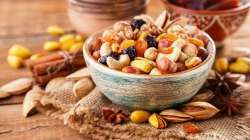What to eat and avoid in winters? Know from Shahnaz Husain
Green leafy vegetables are also rich in Vitamin C and many minerals. Winter is the season for greens, like palak, methi and sarson ka saag. Lettuce is also easily available in winter. In winter, the body also needs more Vitamin A. Have plenty of orange vegetables and fruits, like papayas and carrots, for glowing skin.

Nature is the best physician. She gives us fruits and vegetables that are needed for both health and beauty during the different seasons. In winter, we get plenty of citrus fruits like oranges, kinnow and mosambi, all rich in Vitamin C, which strengthens our immune system. So, it is a good idea to include them in your daily diet. Green leafy vegetables are also rich in Vitamin C and many minerals. Winter is the season for greens, like palak, methi and sarson ka saag. Lettuce is also easily available in winter. In winter, the body also needs more Vitamin A. Have plenty of orange vegetables and fruits, like papayas and carrots, for glowing skin.
Both Vitamin A and C are very important for the skin. Vitamin C strengthens the immune system and delays early aging. It also helps to maintain healthy collagen, the supportive tissue of the skin. Similarly, Vitamin A and E play significant roles in maintaining the softness and smoothness of the skin texture. Dates, seeds, nuts and dry fruits are available in plenty during the winter months. So are peas. These provide proteins, vitamins and minerals which are needed by the body.
They are a source of energy, which the body requires in winter, to maintain body heat. Savouries and snacks are made from seeds like sesame seed (til) and peanuts. However, nuts should be taken unsalted and one should be careful not to have them in large quantities, as they contain fat. Those suffering from high cholesterol should check with a doctor first before taking nuts in large quantity. A diet that is high in fresh fruits and vegetables, unprocessed cereals, sprouted grains, nuts, seeds and yoghurt, can make you look and feel much better in winter. Take fresh fruit and vegetable juices, freshly extracted and diluted with water.
We have to make the correct food choices. Choose processed foods and cereals with care, because they may be high in sugar or salt and low on nutrition. While these foods may provide you with energy, one must wonder about the nutritional values of such food and the long term effect of weight gain. There are foods that we should avoid and reduce the intake of some others. Reduce intake of noodles, pasta, rice, potatoes, beetroot, butter, ghee, as well as cooking oils. They can lead to a congested system and therefore, a congested skin, without any glow. Reduce fats, but do not eliminate them altogether.
Actually, fat is needed by the body. Some vitamins are fat soluble and your body needs fats to assimilate them. Before you know it, you may have a deficiency of one or more of such necessary vitamins. Avoid rich desserts, mithaiand halwas, cakes, ice cream, processed cheese and aerated drinks. Having a fruit instead of a rich, sugary dessert can be the route to a glowing skin. The palate has its preferences, but too many fried foods means the sudden appearance of pimples and spots. Drinking too little water is one of the biggest blunders. Less water means that the body is not getting rid of the accumulations of toxins and wastes. It can also mean an unhealthy skin, with loss of glow.
I always say that good health and beauty are two sides of the same coin. Inner good health for external beauty is an old adage, but holds true. Do you agree? Comment below and let us know.